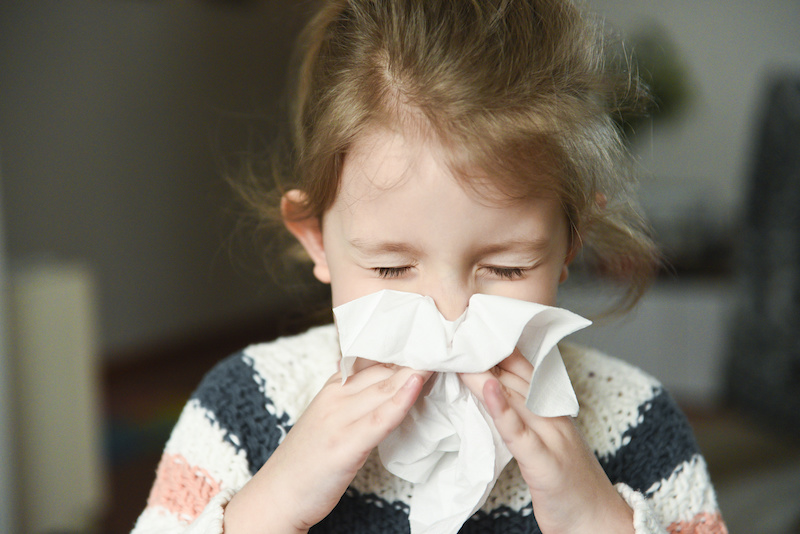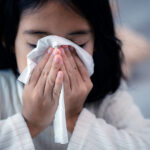Six ways to keep kids with aerodigestive disorders healthy

There’s probably not an adult or child who hasn’t experienced the stuffy nose and difficulty swallowing associated with an upper respiratory infection. Usually, rest, extra fluids, and time help ease such symptoms until the cold clears up. But for kids with aerodigestive conditions, which already affect the ability to eat and breathe, cold and flu season can be much more problematic.
Aerodigestive conditions involve a child’s airway, lungs, and upper digestive tract and can include disorders such as dysphagia (difficulty swallowing) and aspiration (food or liquid entering the lungs). The latter can cause problems such as choking, coughing, gagging during meals, difficulty feeding, vomiting, blue spells, and other symptoms.
“Many patients that we see have swallowing dysfunction in conjunction with gastrointestinal symptoms such as gastroesophageal reflux or vomiting,” says Zoe Chin, a nurse practitioner in the Aerodigestive Center at Boston Children’s Hospital. “When they catch a cold, their symptoms are exacerbated even more.” Here, Chin and her colleague, nurse practitioner Sarah Connearney, offer their tips for helping kids with aerodigestive disorders cope during cold and flu season.
1. Get a flu shot.
Unless the flu vaccine is contraindicated for your child — due to an allergy, for example — they should receive an annual flu shot, ideally early in fall before flu season starts. Your child’s pediatrician can administer the vaccine and answer any questions.
2. Practice frequent handwashing.
According to the Centers for Disease Control and Prevention, regularly washing our hands is one of the best ways to prevent the spread of germs and avoid getting sick. Teach your child how to practice proper handwashing: Scrub hands with soap and water for at least 20 seconds — that’s about the length of two full renditions of the “Happy Birthday” song — and then rinse.
3. Watch fluid intake.
Conventional wisdom dictates that increasing fluid intake during illness is helpful. But for kids with aerodigestive conditions, this approach can backfire. “It’s a very fine line for our patients, because increasing hydration can be difficult in children who aspirate,” explains Connearney. Work with your child’s care team to determine the right amount of fluids for them.
4. Discuss thickened liquids for swallowing problems.
Kids with aerodigestive conditions that cause dysphagia may have an easier time swallowing thickened liquids. Additionally, thickened liquids are heavier, and once swallowed, are less likely to be refluxed. If your child is already on thickened liquids, their clinician may advise you to continue at that consistency through winter. In some cases, the care team may also suggest increasing the thickness.
5. Don’t wean off thickeners yet.
In general, cold and flu season isn’t the best time to start weaning your child off of thickened liquids or make other major changes. That’s because it can be difficult to determine whether any new symptoms are being caused by a cold or because of the wean off thickeners. “We want families to stay wherever they are from a thickening perspective and be patient through the winter,” says Chin. “Although it may be frustrating and feel like you’re not making progress, the safest option is to wait until after cold and flu season to consider making any thickening adjustments.”
6. Consult your care team.
Every child is different, so it’s worth contacting your care team if you have questions or concerns, particularly during cold and flu season. While specialists like those in the Aerodigestive Center have insights and advice specific to your child’s condition, don’t discount the value of your pediatrician, says Connearney. They are a wonderful resource for your child’s overall health.
Get more answers from the Aerodigestive Center.
Related Posts :
-

Tracking influenza in its first battleground: The nose
The answer to curbing influenza could be right under our noses — or, more accurately, inside them. New research maps happenings ...
-

Five ways to help manage your child’s asthma this school year
While fall is a time of considerable change for children — a new school year with new challenges — it can also ...
-

Nanobodies from alpacas could steer immune attacks on influenza
While conventional flu vaccines are designed to anticipate the influenza strains projected to dominate in the next flu season, they’...
-

How transnasal endoscopy got Jamie back on the golf course
Jamie is like most 15-year-olds — he goes to school, hangs out with his friends, and still makes time to get ...





